Banking Royal Commission and Poor Business Practices in Financial Planning and Mortgage Broking Industries
VerifiedAdded on 2022/11/15
|15
|3937
|411
AI Summary
This article discusses the poor business practices within mortgage broking and financial planning industries that triggered the banking royal commission. It also highlights the recommendations made by the commission to the financial planning and mortgage broking industries. The impact of the commission on accounting firms who provide financial planning and mortgage broking services is also discussed.
Contribute Materials
Your contribution can guide someone’s learning journey. Share your
documents today.
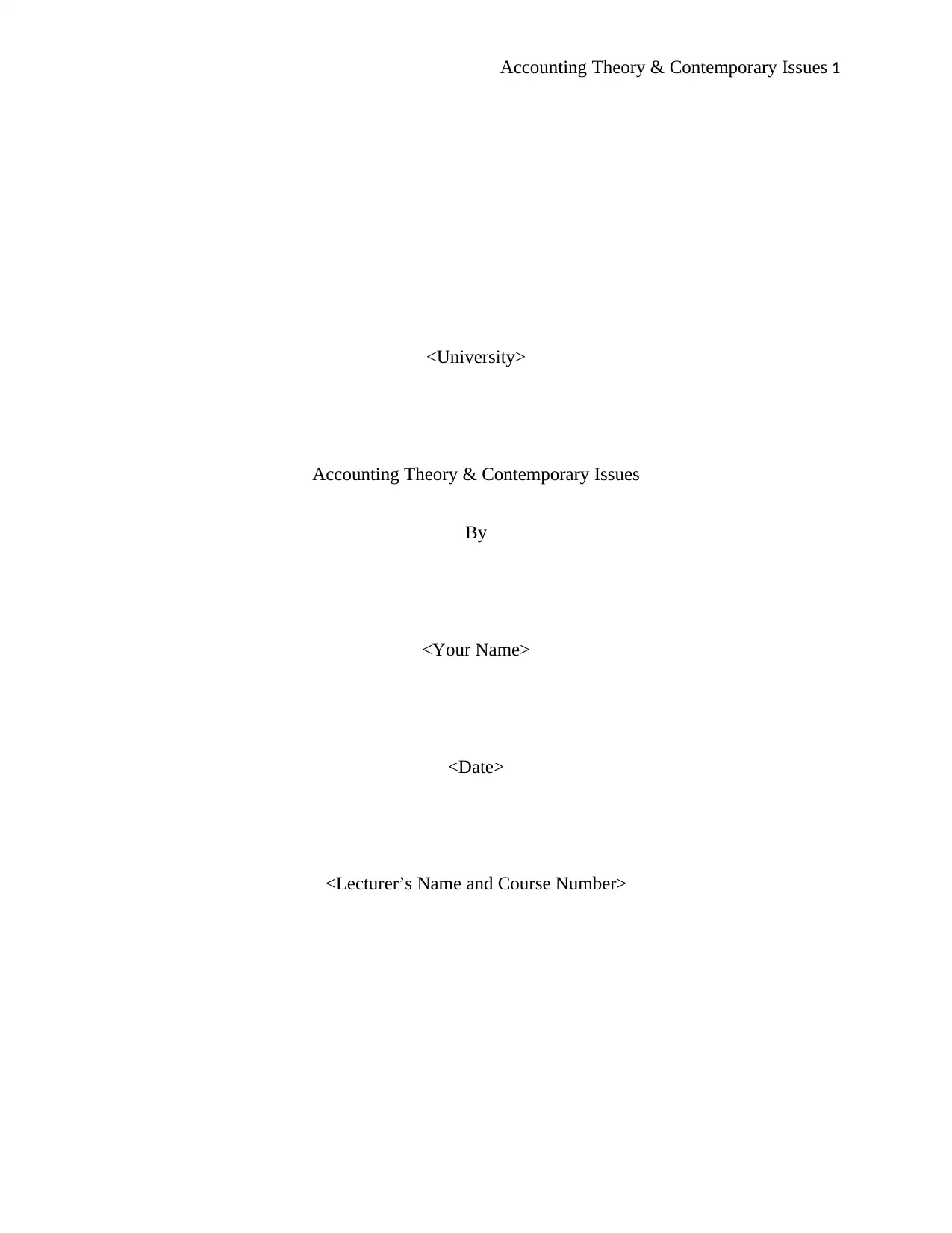
Accounting Theory & Contemporary Issues 1
<University>
Accounting Theory & Contemporary Issues
By
<Your Name>
<Date>
<Lecturer’s Name and Course Number>
<University>
Accounting Theory & Contemporary Issues
By
<Your Name>
<Date>
<Lecturer’s Name and Course Number>
Secure Best Marks with AI Grader
Need help grading? Try our AI Grader for instant feedback on your assignments.
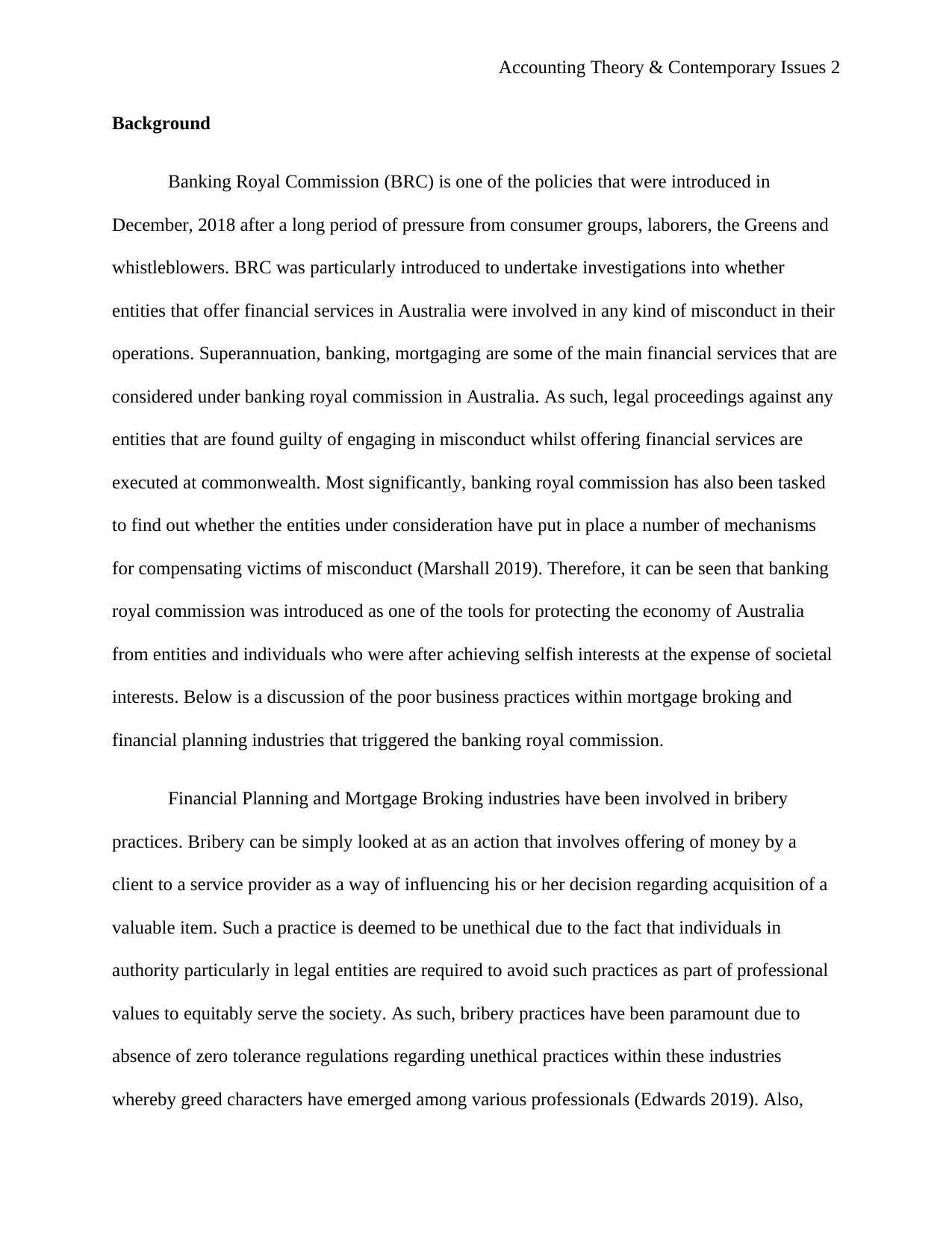
Accounting Theory & Contemporary Issues 2
Background
Banking Royal Commission (BRC) is one of the policies that were introduced in
December, 2018 after a long period of pressure from consumer groups, laborers, the Greens and
whistleblowers. BRC was particularly introduced to undertake investigations into whether
entities that offer financial services in Australia were involved in any kind of misconduct in their
operations. Superannuation, banking, mortgaging are some of the main financial services that are
considered under banking royal commission in Australia. As such, legal proceedings against any
entities that are found guilty of engaging in misconduct whilst offering financial services are
executed at commonwealth. Most significantly, banking royal commission has also been tasked
to find out whether the entities under consideration have put in place a number of mechanisms
for compensating victims of misconduct (Marshall 2019). Therefore, it can be seen that banking
royal commission was introduced as one of the tools for protecting the economy of Australia
from entities and individuals who were after achieving selfish interests at the expense of societal
interests. Below is a discussion of the poor business practices within mortgage broking and
financial planning industries that triggered the banking royal commission.
Financial Planning and Mortgage Broking industries have been involved in bribery
practices. Bribery can be simply looked at as an action that involves offering of money by a
client to a service provider as a way of influencing his or her decision regarding acquisition of a
valuable item. Such a practice is deemed to be unethical due to the fact that individuals in
authority particularly in legal entities are required to avoid such practices as part of professional
values to equitably serve the society. As such, bribery practices have been paramount due to
absence of zero tolerance regulations regarding unethical practices within these industries
whereby greed characters have emerged among various professionals (Edwards 2019). Also,
Background
Banking Royal Commission (BRC) is one of the policies that were introduced in
December, 2018 after a long period of pressure from consumer groups, laborers, the Greens and
whistleblowers. BRC was particularly introduced to undertake investigations into whether
entities that offer financial services in Australia were involved in any kind of misconduct in their
operations. Superannuation, banking, mortgaging are some of the main financial services that are
considered under banking royal commission in Australia. As such, legal proceedings against any
entities that are found guilty of engaging in misconduct whilst offering financial services are
executed at commonwealth. Most significantly, banking royal commission has also been tasked
to find out whether the entities under consideration have put in place a number of mechanisms
for compensating victims of misconduct (Marshall 2019). Therefore, it can be seen that banking
royal commission was introduced as one of the tools for protecting the economy of Australia
from entities and individuals who were after achieving selfish interests at the expense of societal
interests. Below is a discussion of the poor business practices within mortgage broking and
financial planning industries that triggered the banking royal commission.
Financial Planning and Mortgage Broking industries have been involved in bribery
practices. Bribery can be simply looked at as an action that involves offering of money by a
client to a service provider as a way of influencing his or her decision regarding acquisition of a
valuable item. Such a practice is deemed to be unethical due to the fact that individuals in
authority particularly in legal entities are required to avoid such practices as part of professional
values to equitably serve the society. As such, bribery practices have been paramount due to
absence of zero tolerance regulations regarding unethical practices within these industries
whereby greed characters have emerged among various professionals (Edwards 2019). Also,

Accounting Theory & Contemporary Issues 3
anti-corruption government agencies of Australia have been ineffective in their efforts to identify
and apprehend professionals who have been engaging in bribery. As such, professionals in
Financial Planning and Mortgage Broking industries have engaged in bribery as a way of
meeting their personal interests at the expense of interests of the general public. For example,
National Australia Bank staff was allegedly involved in faking of pay slips and Medicare cards
whereby bribes were paid by clients in order to get their loans. After receiving the bribes, the
staff approved the loan acquisitions of the clients yet they could not fully meet all the basic
requirements for acquiring such loans (Janda 2019). From this point of view, it can be implied
that involvement of Financial Planning and Mortgage Broking industries in bribery is one of the
poor business practices that triggered banking royal commission in Australia.
Financial Planning and Mortgage Broking industries have also continuously failed to
verify living expenses of clients prior to advancement of loans unto them. As such, some entities
that offer financial services such as West Pac Accountancy Company have always not utilized all
relevant prerequisites that are needed by clients before securing home loans. Moreover, it is a
legal requirement that clients always provide all the necessary documents prior to acquisition of
home loans implying that any client who does not meet all the prerequisites does not qualify for
a home loan. On the other hand, entities that provide financial services are mandated to
disqualify any clients who do not possess all the necessary documents for acquiring a home loan.
Also, the above entities were also required to ensure that clients fully provided all the necessary
documents prior to advancement of loans (O’Dwyer 2017). However, clients have only been
required to have employment letters as proof for income before acquiring home loans without
taking into account other necessary documents such as pay slips. Such a factor meant that home
loans were only advance upon confirmation that clients were earning incomes without
anti-corruption government agencies of Australia have been ineffective in their efforts to identify
and apprehend professionals who have been engaging in bribery. As such, professionals in
Financial Planning and Mortgage Broking industries have engaged in bribery as a way of
meeting their personal interests at the expense of interests of the general public. For example,
National Australia Bank staff was allegedly involved in faking of pay slips and Medicare cards
whereby bribes were paid by clients in order to get their loans. After receiving the bribes, the
staff approved the loan acquisitions of the clients yet they could not fully meet all the basic
requirements for acquiring such loans (Janda 2019). From this point of view, it can be implied
that involvement of Financial Planning and Mortgage Broking industries in bribery is one of the
poor business practices that triggered banking royal commission in Australia.
Financial Planning and Mortgage Broking industries have also continuously failed to
verify living expenses of clients prior to advancement of loans unto them. As such, some entities
that offer financial services such as West Pac Accountancy Company have always not utilized all
relevant prerequisites that are needed by clients before securing home loans. Moreover, it is a
legal requirement that clients always provide all the necessary documents prior to acquisition of
home loans implying that any client who does not meet all the prerequisites does not qualify for
a home loan. On the other hand, entities that provide financial services are mandated to
disqualify any clients who do not possess all the necessary documents for acquiring a home loan.
Also, the above entities were also required to ensure that clients fully provided all the necessary
documents prior to advancement of loans (O’Dwyer 2017). However, clients have only been
required to have employment letters as proof for income before acquiring home loans without
taking into account other necessary documents such as pay slips. Such a factor meant that home
loans were only advance upon confirmation that clients were earning incomes without
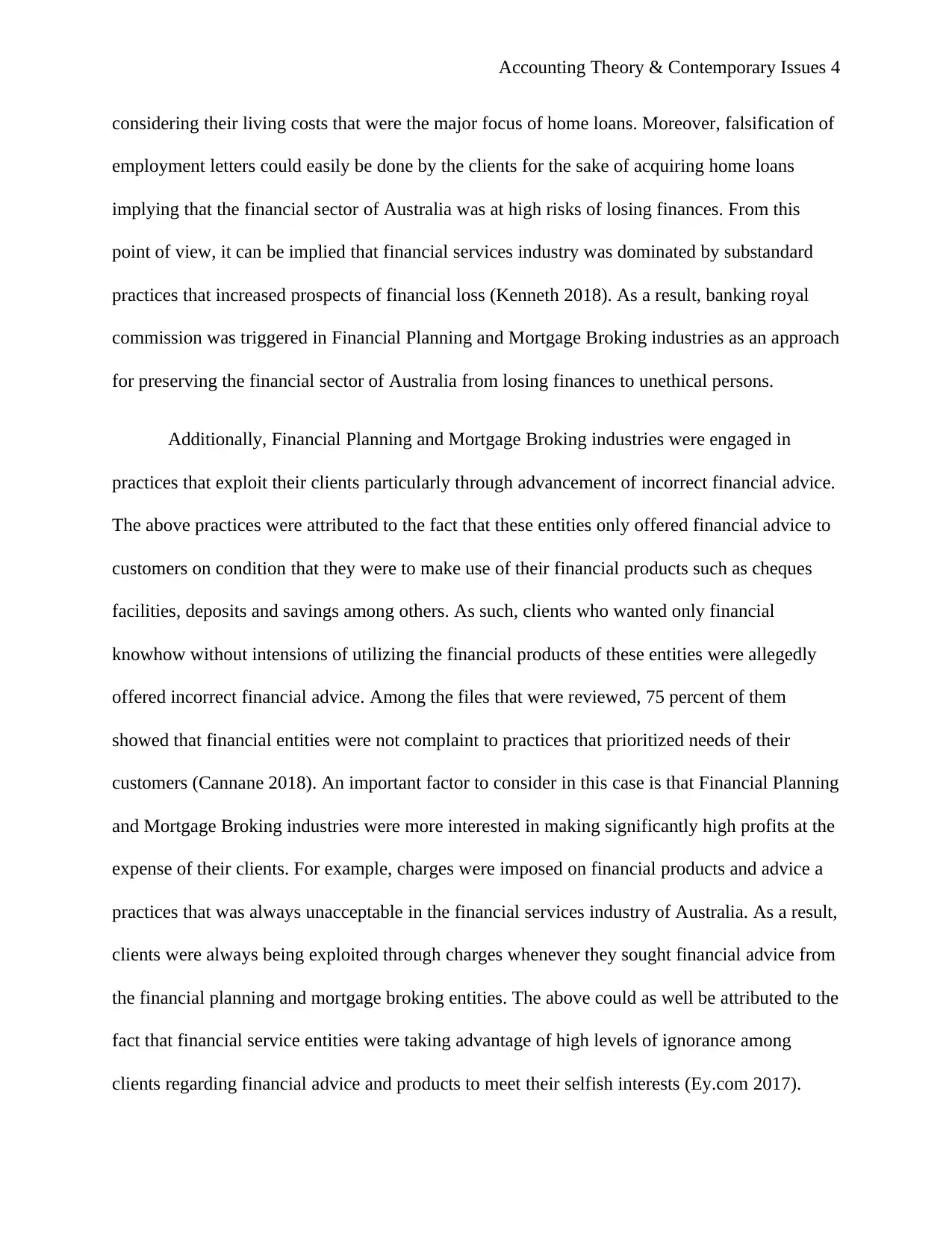
Accounting Theory & Contemporary Issues 4
considering their living costs that were the major focus of home loans. Moreover, falsification of
employment letters could easily be done by the clients for the sake of acquiring home loans
implying that the financial sector of Australia was at high risks of losing finances. From this
point of view, it can be implied that financial services industry was dominated by substandard
practices that increased prospects of financial loss (Kenneth 2018). As a result, banking royal
commission was triggered in Financial Planning and Mortgage Broking industries as an approach
for preserving the financial sector of Australia from losing finances to unethical persons.
Additionally, Financial Planning and Mortgage Broking industries were engaged in
practices that exploit their clients particularly through advancement of incorrect financial advice.
The above practices were attributed to the fact that these entities only offered financial advice to
customers on condition that they were to make use of their financial products such as cheques
facilities, deposits and savings among others. As such, clients who wanted only financial
knowhow without intensions of utilizing the financial products of these entities were allegedly
offered incorrect financial advice. Among the files that were reviewed, 75 percent of them
showed that financial entities were not complaint to practices that prioritized needs of their
customers (Cannane 2018). An important factor to consider in this case is that Financial Planning
and Mortgage Broking industries were more interested in making significantly high profits at the
expense of their clients. For example, charges were imposed on financial products and advice a
practices that was always unacceptable in the financial services industry of Australia. As a result,
clients were always being exploited through charges whenever they sought financial advice from
the financial planning and mortgage broking entities. The above could as well be attributed to the
fact that financial service entities were taking advantage of high levels of ignorance among
clients regarding financial advice and products to meet their selfish interests (Ey.com 2017).
considering their living costs that were the major focus of home loans. Moreover, falsification of
employment letters could easily be done by the clients for the sake of acquiring home loans
implying that the financial sector of Australia was at high risks of losing finances. From this
point of view, it can be implied that financial services industry was dominated by substandard
practices that increased prospects of financial loss (Kenneth 2018). As a result, banking royal
commission was triggered in Financial Planning and Mortgage Broking industries as an approach
for preserving the financial sector of Australia from losing finances to unethical persons.
Additionally, Financial Planning and Mortgage Broking industries were engaged in
practices that exploit their clients particularly through advancement of incorrect financial advice.
The above practices were attributed to the fact that these entities only offered financial advice to
customers on condition that they were to make use of their financial products such as cheques
facilities, deposits and savings among others. As such, clients who wanted only financial
knowhow without intensions of utilizing the financial products of these entities were allegedly
offered incorrect financial advice. Among the files that were reviewed, 75 percent of them
showed that financial entities were not complaint to practices that prioritized needs of their
customers (Cannane 2018). An important factor to consider in this case is that Financial Planning
and Mortgage Broking industries were more interested in making significantly high profits at the
expense of their clients. For example, charges were imposed on financial products and advice a
practices that was always unacceptable in the financial services industry of Australia. As a result,
clients were always being exploited through charges whenever they sought financial advice from
the financial planning and mortgage broking entities. The above could as well be attributed to the
fact that financial service entities were taking advantage of high levels of ignorance among
clients regarding financial advice and products to meet their selfish interests (Ey.com 2017).
Secure Best Marks with AI Grader
Need help grading? Try our AI Grader for instant feedback on your assignments.
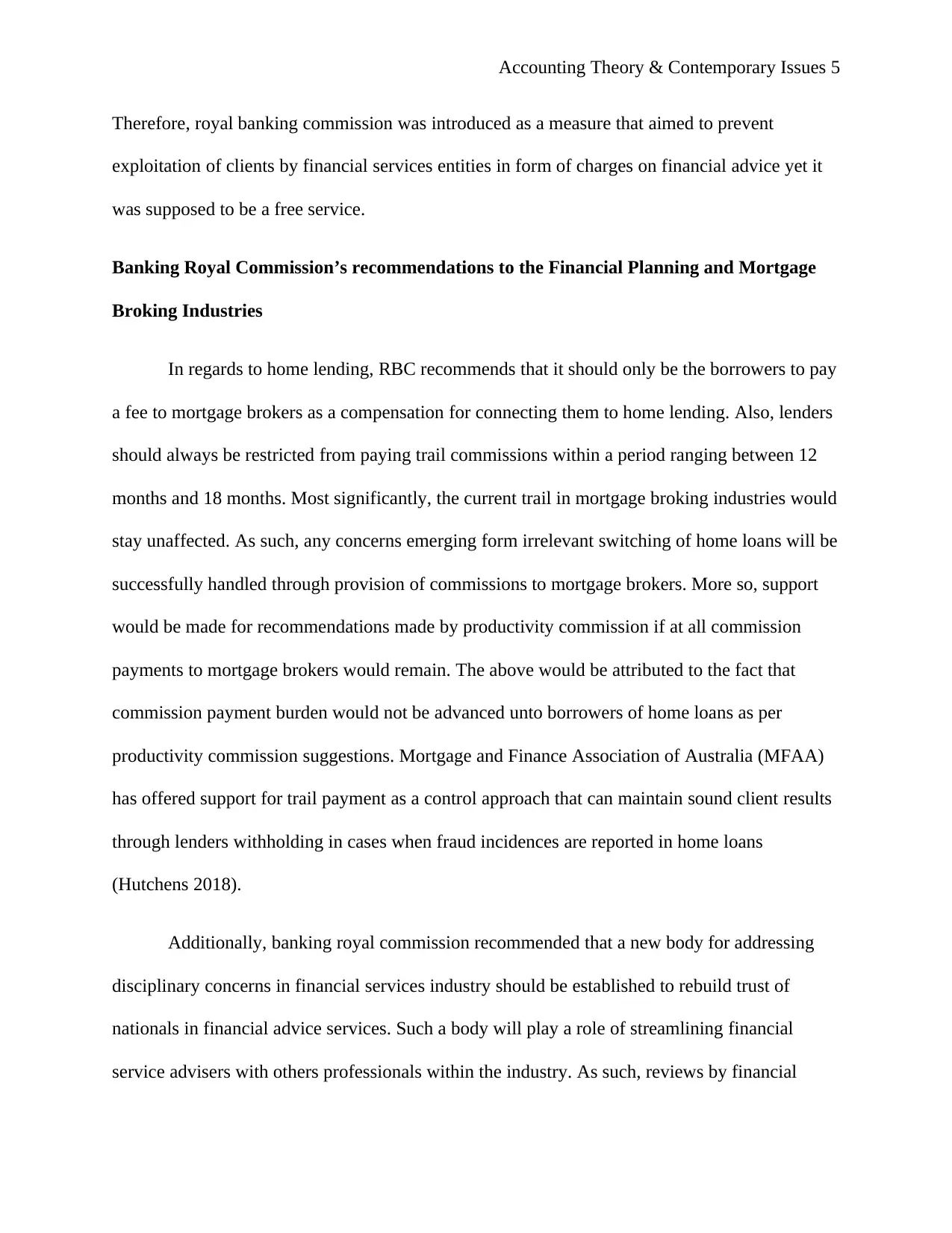
Accounting Theory & Contemporary Issues 5
Therefore, royal banking commission was introduced as a measure that aimed to prevent
exploitation of clients by financial services entities in form of charges on financial advice yet it
was supposed to be a free service.
Banking Royal Commission’s recommendations to the Financial Planning and Mortgage
Broking Industries
In regards to home lending, RBC recommends that it should only be the borrowers to pay
a fee to mortgage brokers as a compensation for connecting them to home lending. Also, lenders
should always be restricted from paying trail commissions within a period ranging between 12
months and 18 months. Most significantly, the current trail in mortgage broking industries would
stay unaffected. As such, any concerns emerging form irrelevant switching of home loans will be
successfully handled through provision of commissions to mortgage brokers. More so, support
would be made for recommendations made by productivity commission if at all commission
payments to mortgage brokers would remain. The above would be attributed to the fact that
commission payment burden would not be advanced unto borrowers of home loans as per
productivity commission suggestions. Mortgage and Finance Association of Australia (MFAA)
has offered support for trail payment as a control approach that can maintain sound client results
through lenders withholding in cases when fraud incidences are reported in home loans
(Hutchens 2018).
Additionally, banking royal commission recommended that a new body for addressing
disciplinary concerns in financial services industry should be established to rebuild trust of
nationals in financial advice services. Such a body will play a role of streamlining financial
service advisers with others professionals within the industry. As such, reviews by financial
Therefore, royal banking commission was introduced as a measure that aimed to prevent
exploitation of clients by financial services entities in form of charges on financial advice yet it
was supposed to be a free service.
Banking Royal Commission’s recommendations to the Financial Planning and Mortgage
Broking Industries
In regards to home lending, RBC recommends that it should only be the borrowers to pay
a fee to mortgage brokers as a compensation for connecting them to home lending. Also, lenders
should always be restricted from paying trail commissions within a period ranging between 12
months and 18 months. Most significantly, the current trail in mortgage broking industries would
stay unaffected. As such, any concerns emerging form irrelevant switching of home loans will be
successfully handled through provision of commissions to mortgage brokers. More so, support
would be made for recommendations made by productivity commission if at all commission
payments to mortgage brokers would remain. The above would be attributed to the fact that
commission payment burden would not be advanced unto borrowers of home loans as per
productivity commission suggestions. Mortgage and Finance Association of Australia (MFAA)
has offered support for trail payment as a control approach that can maintain sound client results
through lenders withholding in cases when fraud incidences are reported in home loans
(Hutchens 2018).
Additionally, banking royal commission recommended that a new body for addressing
disciplinary concerns in financial services industry should be established to rebuild trust of
nationals in financial advice services. Such a body will play a role of streamlining financial
service advisers with others professionals within the industry. As such, reviews by financial
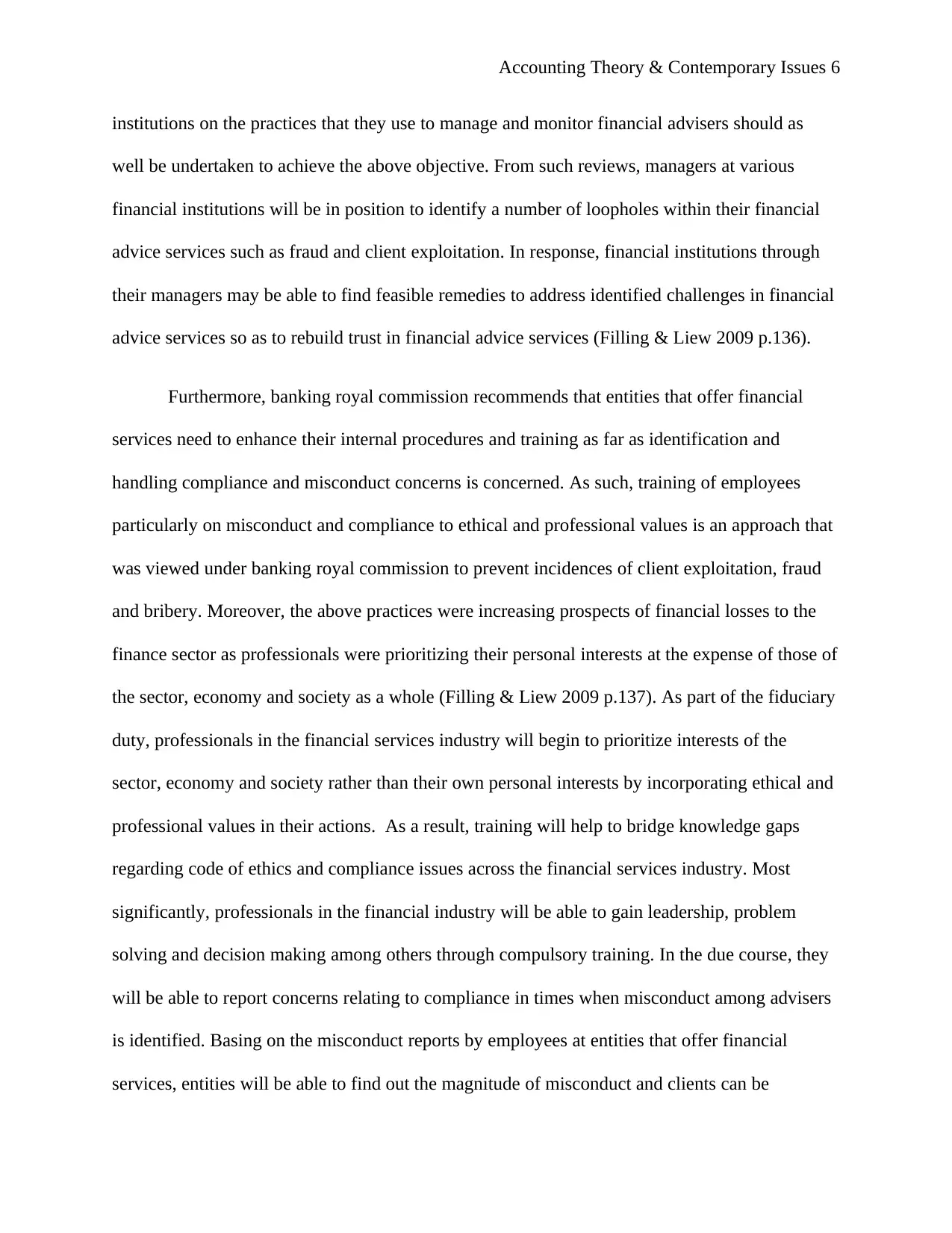
Accounting Theory & Contemporary Issues 6
institutions on the practices that they use to manage and monitor financial advisers should as
well be undertaken to achieve the above objective. From such reviews, managers at various
financial institutions will be in position to identify a number of loopholes within their financial
advice services such as fraud and client exploitation. In response, financial institutions through
their managers may be able to find feasible remedies to address identified challenges in financial
advice services so as to rebuild trust in financial advice services (Filling & Liew 2009 p.136).
Furthermore, banking royal commission recommends that entities that offer financial
services need to enhance their internal procedures and training as far as identification and
handling compliance and misconduct concerns is concerned. As such, training of employees
particularly on misconduct and compliance to ethical and professional values is an approach that
was viewed under banking royal commission to prevent incidences of client exploitation, fraud
and bribery. Moreover, the above practices were increasing prospects of financial losses to the
finance sector as professionals were prioritizing their personal interests at the expense of those of
the sector, economy and society as a whole (Filling & Liew 2009 p.137). As part of the fiduciary
duty, professionals in the financial services industry will begin to prioritize interests of the
sector, economy and society rather than their own personal interests by incorporating ethical and
professional values in their actions. As a result, training will help to bridge knowledge gaps
regarding code of ethics and compliance issues across the financial services industry. Most
significantly, professionals in the financial industry will be able to gain leadership, problem
solving and decision making among others through compulsory training. In the due course, they
will be able to report concerns relating to compliance in times when misconduct among advisers
is identified. Basing on the misconduct reports by employees at entities that offer financial
services, entities will be able to find out the magnitude of misconduct and clients can be
institutions on the practices that they use to manage and monitor financial advisers should as
well be undertaken to achieve the above objective. From such reviews, managers at various
financial institutions will be in position to identify a number of loopholes within their financial
advice services such as fraud and client exploitation. In response, financial institutions through
their managers may be able to find feasible remedies to address identified challenges in financial
advice services so as to rebuild trust in financial advice services (Filling & Liew 2009 p.136).
Furthermore, banking royal commission recommends that entities that offer financial
services need to enhance their internal procedures and training as far as identification and
handling compliance and misconduct concerns is concerned. As such, training of employees
particularly on misconduct and compliance to ethical and professional values is an approach that
was viewed under banking royal commission to prevent incidences of client exploitation, fraud
and bribery. Moreover, the above practices were increasing prospects of financial losses to the
finance sector as professionals were prioritizing their personal interests at the expense of those of
the sector, economy and society as a whole (Filling & Liew 2009 p.137). As part of the fiduciary
duty, professionals in the financial services industry will begin to prioritize interests of the
sector, economy and society rather than their own personal interests by incorporating ethical and
professional values in their actions. As a result, training will help to bridge knowledge gaps
regarding code of ethics and compliance issues across the financial services industry. Most
significantly, professionals in the financial industry will be able to gain leadership, problem
solving and decision making among others through compulsory training. In the due course, they
will be able to report concerns relating to compliance in times when misconduct among advisers
is identified. Basing on the misconduct reports by employees at entities that offer financial
services, entities will be able to find out the magnitude of misconduct and clients can be
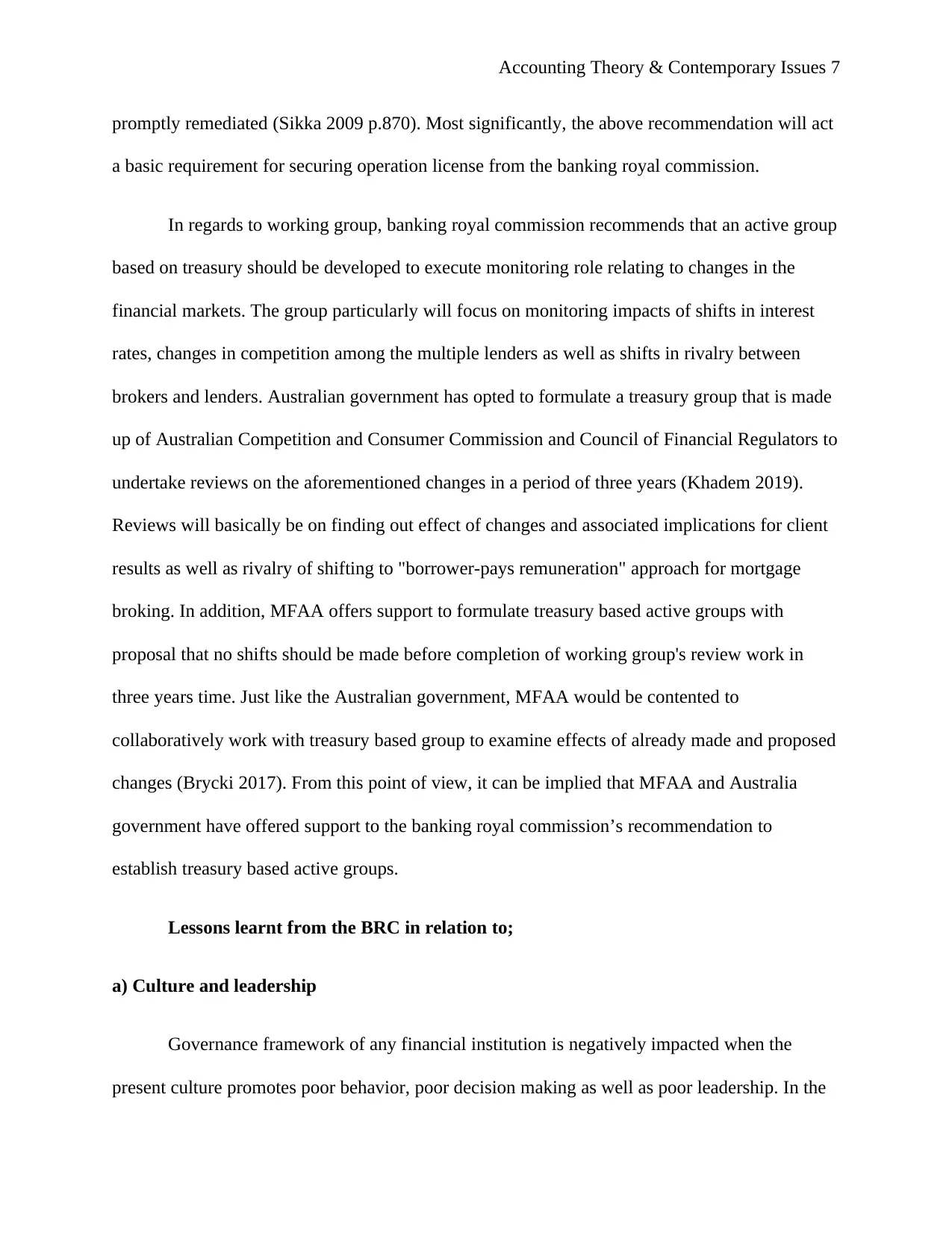
Accounting Theory & Contemporary Issues 7
promptly remediated (Sikka 2009 p.870). Most significantly, the above recommendation will act
a basic requirement for securing operation license from the banking royal commission.
In regards to working group, banking royal commission recommends that an active group
based on treasury should be developed to execute monitoring role relating to changes in the
financial markets. The group particularly will focus on monitoring impacts of shifts in interest
rates, changes in competition among the multiple lenders as well as shifts in rivalry between
brokers and lenders. Australian government has opted to formulate a treasury group that is made
up of Australian Competition and Consumer Commission and Council of Financial Regulators to
undertake reviews on the aforementioned changes in a period of three years (Khadem 2019).
Reviews will basically be on finding out effect of changes and associated implications for client
results as well as rivalry of shifting to "borrower-pays remuneration" approach for mortgage
broking. In addition, MFAA offers support to formulate treasury based active groups with
proposal that no shifts should be made before completion of working group's review work in
three years time. Just like the Australian government, MFAA would be contented to
collaboratively work with treasury based group to examine effects of already made and proposed
changes (Brycki 2017). From this point of view, it can be implied that MFAA and Australia
government have offered support to the banking royal commission’s recommendation to
establish treasury based active groups.
Lessons learnt from the BRC in relation to;
a) Culture and leadership
Governance framework of any financial institution is negatively impacted when the
present culture promotes poor behavior, poor decision making as well as poor leadership. In the
promptly remediated (Sikka 2009 p.870). Most significantly, the above recommendation will act
a basic requirement for securing operation license from the banking royal commission.
In regards to working group, banking royal commission recommends that an active group
based on treasury should be developed to execute monitoring role relating to changes in the
financial markets. The group particularly will focus on monitoring impacts of shifts in interest
rates, changes in competition among the multiple lenders as well as shifts in rivalry between
brokers and lenders. Australian government has opted to formulate a treasury group that is made
up of Australian Competition and Consumer Commission and Council of Financial Regulators to
undertake reviews on the aforementioned changes in a period of three years (Khadem 2019).
Reviews will basically be on finding out effect of changes and associated implications for client
results as well as rivalry of shifting to "borrower-pays remuneration" approach for mortgage
broking. In addition, MFAA offers support to formulate treasury based active groups with
proposal that no shifts should be made before completion of working group's review work in
three years time. Just like the Australian government, MFAA would be contented to
collaboratively work with treasury based group to examine effects of already made and proposed
changes (Brycki 2017). From this point of view, it can be implied that MFAA and Australia
government have offered support to the banking royal commission’s recommendation to
establish treasury based active groups.
Lessons learnt from the BRC in relation to;
a) Culture and leadership
Governance framework of any financial institution is negatively impacted when the
present culture promotes poor behavior, poor decision making as well as poor leadership. In the
Paraphrase This Document
Need a fresh take? Get an instant paraphrase of this document with our AI Paraphraser
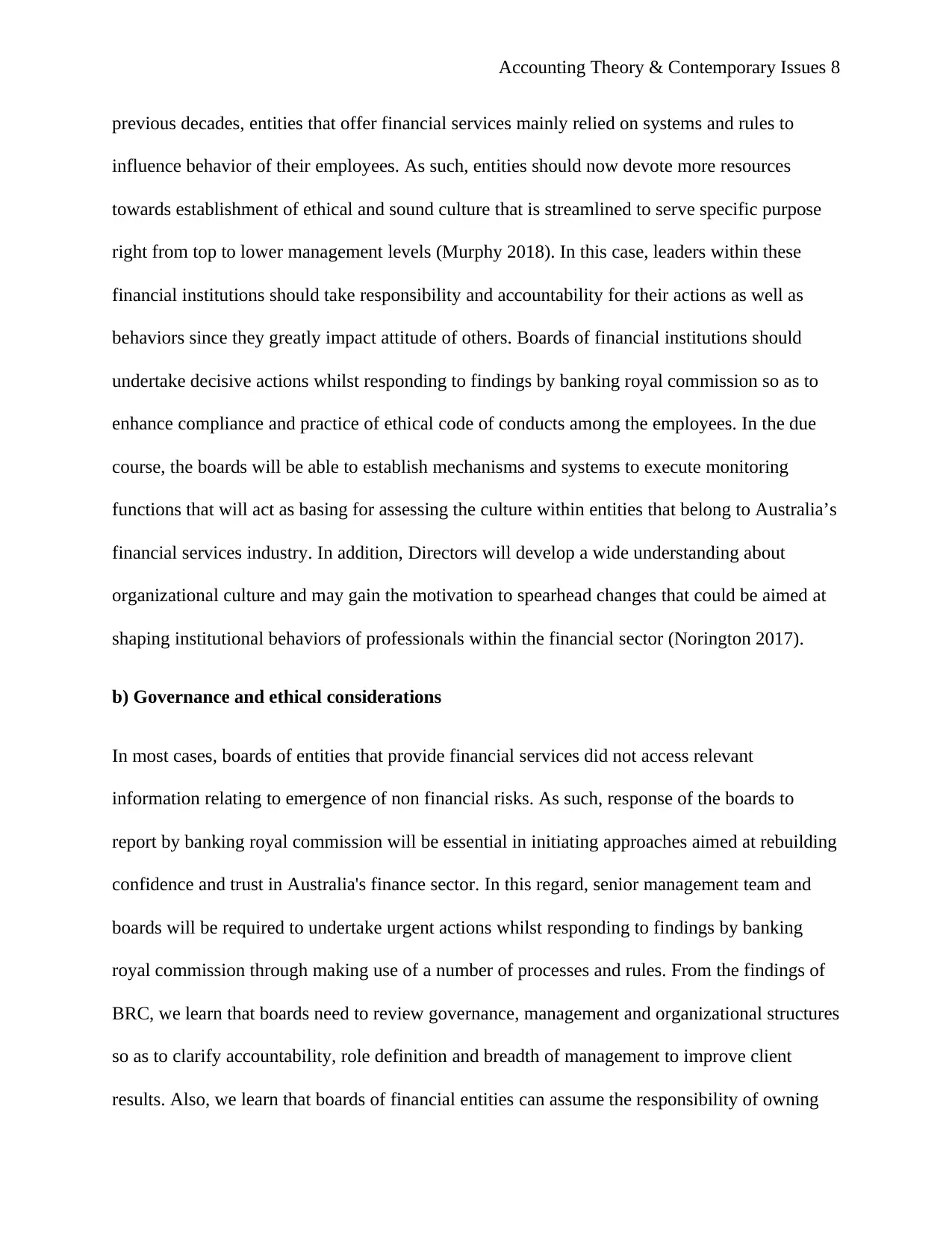
Accounting Theory & Contemporary Issues 8
previous decades, entities that offer financial services mainly relied on systems and rules to
influence behavior of their employees. As such, entities should now devote more resources
towards establishment of ethical and sound culture that is streamlined to serve specific purpose
right from top to lower management levels (Murphy 2018). In this case, leaders within these
financial institutions should take responsibility and accountability for their actions as well as
behaviors since they greatly impact attitude of others. Boards of financial institutions should
undertake decisive actions whilst responding to findings by banking royal commission so as to
enhance compliance and practice of ethical code of conducts among the employees. In the due
course, the boards will be able to establish mechanisms and systems to execute monitoring
functions that will act as basing for assessing the culture within entities that belong to Australia’s
financial services industry. In addition, Directors will develop a wide understanding about
organizational culture and may gain the motivation to spearhead changes that could be aimed at
shaping institutional behaviors of professionals within the financial sector (Norington 2017).
b) Governance and ethical considerations
In most cases, boards of entities that provide financial services did not access relevant
information relating to emergence of non financial risks. As such, response of the boards to
report by banking royal commission will be essential in initiating approaches aimed at rebuilding
confidence and trust in Australia's finance sector. In this regard, senior management team and
boards will be required to undertake urgent actions whilst responding to findings by banking
royal commission through making use of a number of processes and rules. From the findings of
BRC, we learn that boards need to review governance, management and organizational structures
so as to clarify accountability, role definition and breadth of management to improve client
results. Also, we learn that boards of financial entities can assume the responsibility of owning
previous decades, entities that offer financial services mainly relied on systems and rules to
influence behavior of their employees. As such, entities should now devote more resources
towards establishment of ethical and sound culture that is streamlined to serve specific purpose
right from top to lower management levels (Murphy 2018). In this case, leaders within these
financial institutions should take responsibility and accountability for their actions as well as
behaviors since they greatly impact attitude of others. Boards of financial institutions should
undertake decisive actions whilst responding to findings by banking royal commission so as to
enhance compliance and practice of ethical code of conducts among the employees. In the due
course, the boards will be able to establish mechanisms and systems to execute monitoring
functions that will act as basing for assessing the culture within entities that belong to Australia’s
financial services industry. In addition, Directors will develop a wide understanding about
organizational culture and may gain the motivation to spearhead changes that could be aimed at
shaping institutional behaviors of professionals within the financial sector (Norington 2017).
b) Governance and ethical considerations
In most cases, boards of entities that provide financial services did not access relevant
information relating to emergence of non financial risks. As such, response of the boards to
report by banking royal commission will be essential in initiating approaches aimed at rebuilding
confidence and trust in Australia's finance sector. In this regard, senior management team and
boards will be required to undertake urgent actions whilst responding to findings by banking
royal commission through making use of a number of processes and rules. From the findings of
BRC, we learn that boards need to review governance, management and organizational structures
so as to clarify accountability, role definition and breadth of management to improve client
results. Also, we learn that boards of financial entities can assume the responsibility of owning
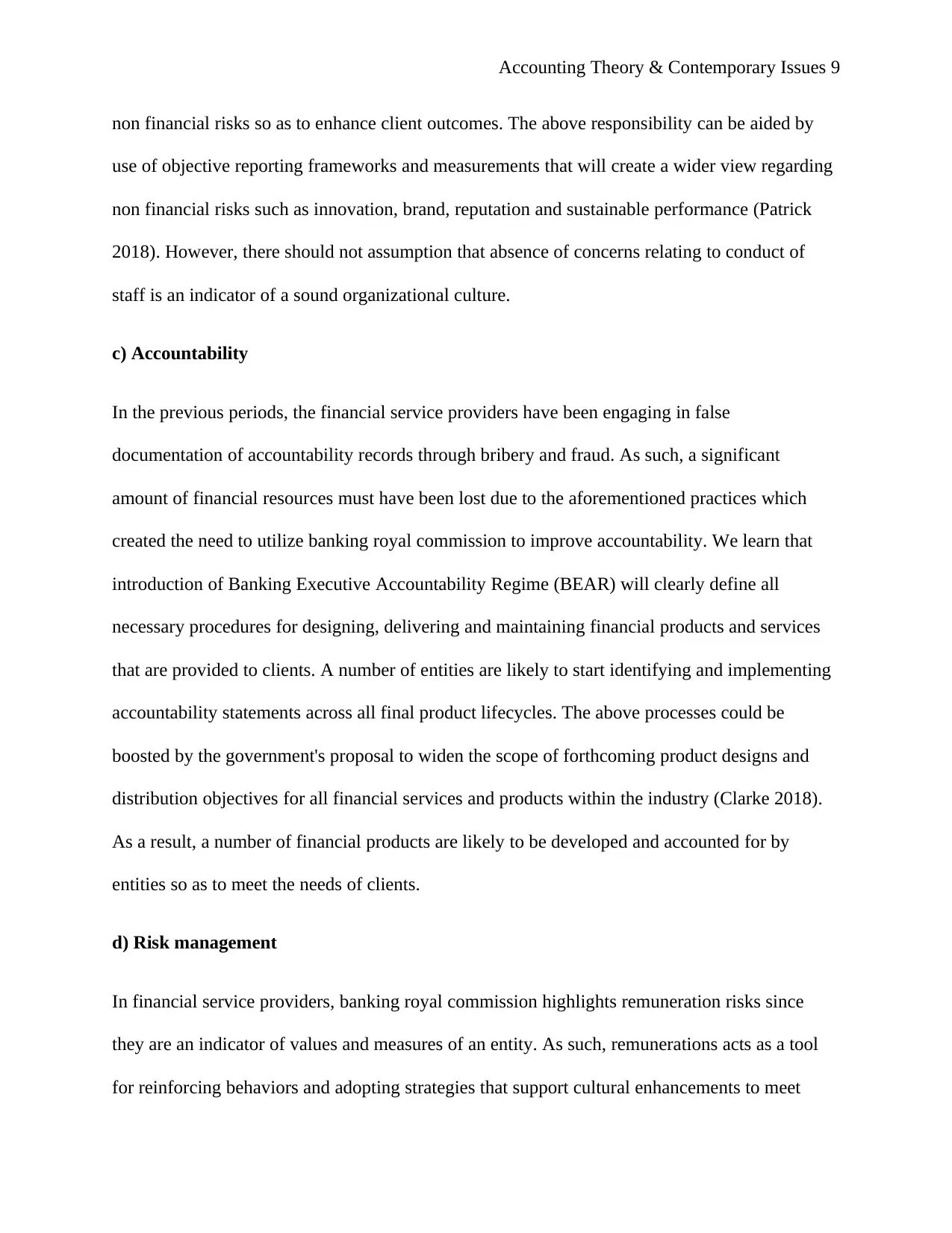
Accounting Theory & Contemporary Issues 9
non financial risks so as to enhance client outcomes. The above responsibility can be aided by
use of objective reporting frameworks and measurements that will create a wider view regarding
non financial risks such as innovation, brand, reputation and sustainable performance (Patrick
2018). However, there should not assumption that absence of concerns relating to conduct of
staff is an indicator of a sound organizational culture.
c) Accountability
In the previous periods, the financial service providers have been engaging in false
documentation of accountability records through bribery and fraud. As such, a significant
amount of financial resources must have been lost due to the aforementioned practices which
created the need to utilize banking royal commission to improve accountability. We learn that
introduction of Banking Executive Accountability Regime (BEAR) will clearly define all
necessary procedures for designing, delivering and maintaining financial products and services
that are provided to clients. A number of entities are likely to start identifying and implementing
accountability statements across all final product lifecycles. The above processes could be
boosted by the government's proposal to widen the scope of forthcoming product designs and
distribution objectives for all financial services and products within the industry (Clarke 2018).
As a result, a number of financial products are likely to be developed and accounted for by
entities so as to meet the needs of clients.
d) Risk management
In financial service providers, banking royal commission highlights remuneration risks since
they are an indicator of values and measures of an entity. As such, remunerations acts as a tool
for reinforcing behaviors and adopting strategies that support cultural enhancements to meet
non financial risks so as to enhance client outcomes. The above responsibility can be aided by
use of objective reporting frameworks and measurements that will create a wider view regarding
non financial risks such as innovation, brand, reputation and sustainable performance (Patrick
2018). However, there should not assumption that absence of concerns relating to conduct of
staff is an indicator of a sound organizational culture.
c) Accountability
In the previous periods, the financial service providers have been engaging in false
documentation of accountability records through bribery and fraud. As such, a significant
amount of financial resources must have been lost due to the aforementioned practices which
created the need to utilize banking royal commission to improve accountability. We learn that
introduction of Banking Executive Accountability Regime (BEAR) will clearly define all
necessary procedures for designing, delivering and maintaining financial products and services
that are provided to clients. A number of entities are likely to start identifying and implementing
accountability statements across all final product lifecycles. The above processes could be
boosted by the government's proposal to widen the scope of forthcoming product designs and
distribution objectives for all financial services and products within the industry (Clarke 2018).
As a result, a number of financial products are likely to be developed and accounted for by
entities so as to meet the needs of clients.
d) Risk management
In financial service providers, banking royal commission highlights remuneration risks since
they are an indicator of values and measures of an entity. As such, remunerations acts as a tool
for reinforcing behaviors and adopting strategies that support cultural enhancements to meet
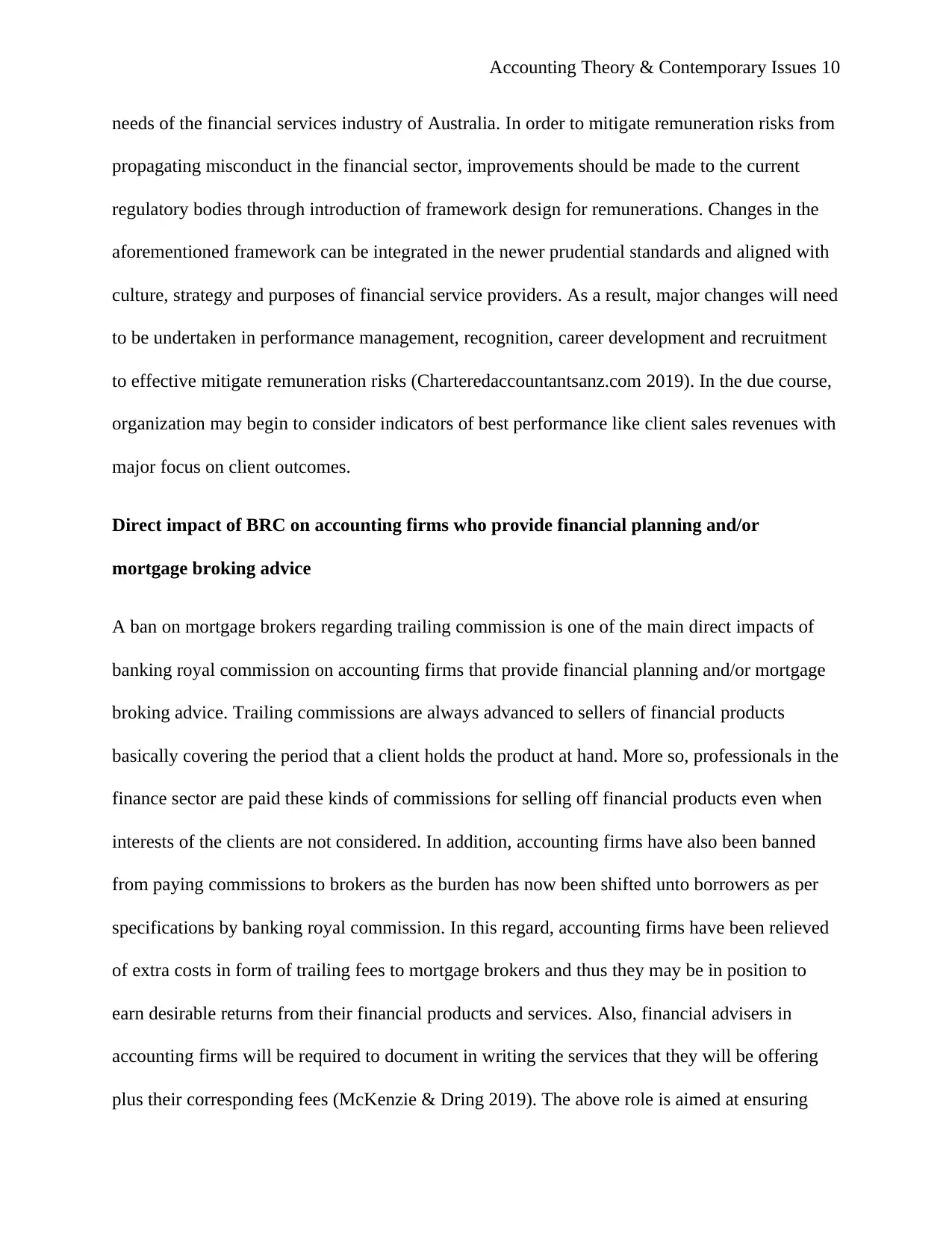
Accounting Theory & Contemporary Issues 10
needs of the financial services industry of Australia. In order to mitigate remuneration risks from
propagating misconduct in the financial sector, improvements should be made to the current
regulatory bodies through introduction of framework design for remunerations. Changes in the
aforementioned framework can be integrated in the newer prudential standards and aligned with
culture, strategy and purposes of financial service providers. As a result, major changes will need
to be undertaken in performance management, recognition, career development and recruitment
to effective mitigate remuneration risks (Charteredaccountantsanz.com 2019). In the due course,
organization may begin to consider indicators of best performance like client sales revenues with
major focus on client outcomes.
Direct impact of BRC on accounting firms who provide financial planning and/or
mortgage broking advice
A ban on mortgage brokers regarding trailing commission is one of the main direct impacts of
banking royal commission on accounting firms that provide financial planning and/or mortgage
broking advice. Trailing commissions are always advanced to sellers of financial products
basically covering the period that a client holds the product at hand. More so, professionals in the
finance sector are paid these kinds of commissions for selling off financial products even when
interests of the clients are not considered. In addition, accounting firms have also been banned
from paying commissions to brokers as the burden has now been shifted unto borrowers as per
specifications by banking royal commission. In this regard, accounting firms have been relieved
of extra costs in form of trailing fees to mortgage brokers and thus they may be in position to
earn desirable returns from their financial products and services. Also, financial advisers in
accounting firms will be required to document in writing the services that they will be offering
plus their corresponding fees (McKenzie & Dring 2019). The above role is aimed at ensuring
needs of the financial services industry of Australia. In order to mitigate remuneration risks from
propagating misconduct in the financial sector, improvements should be made to the current
regulatory bodies through introduction of framework design for remunerations. Changes in the
aforementioned framework can be integrated in the newer prudential standards and aligned with
culture, strategy and purposes of financial service providers. As a result, major changes will need
to be undertaken in performance management, recognition, career development and recruitment
to effective mitigate remuneration risks (Charteredaccountantsanz.com 2019). In the due course,
organization may begin to consider indicators of best performance like client sales revenues with
major focus on client outcomes.
Direct impact of BRC on accounting firms who provide financial planning and/or
mortgage broking advice
A ban on mortgage brokers regarding trailing commission is one of the main direct impacts of
banking royal commission on accounting firms that provide financial planning and/or mortgage
broking advice. Trailing commissions are always advanced to sellers of financial products
basically covering the period that a client holds the product at hand. More so, professionals in the
finance sector are paid these kinds of commissions for selling off financial products even when
interests of the clients are not considered. In addition, accounting firms have also been banned
from paying commissions to brokers as the burden has now been shifted unto borrowers as per
specifications by banking royal commission. In this regard, accounting firms have been relieved
of extra costs in form of trailing fees to mortgage brokers and thus they may be in position to
earn desirable returns from their financial products and services. Also, financial advisers in
accounting firms will be required to document in writing the services that they will be offering
plus their corresponding fees (McKenzie & Dring 2019). The above role is aimed at ensuring
Secure Best Marks with AI Grader
Need help grading? Try our AI Grader for instant feedback on your assignments.
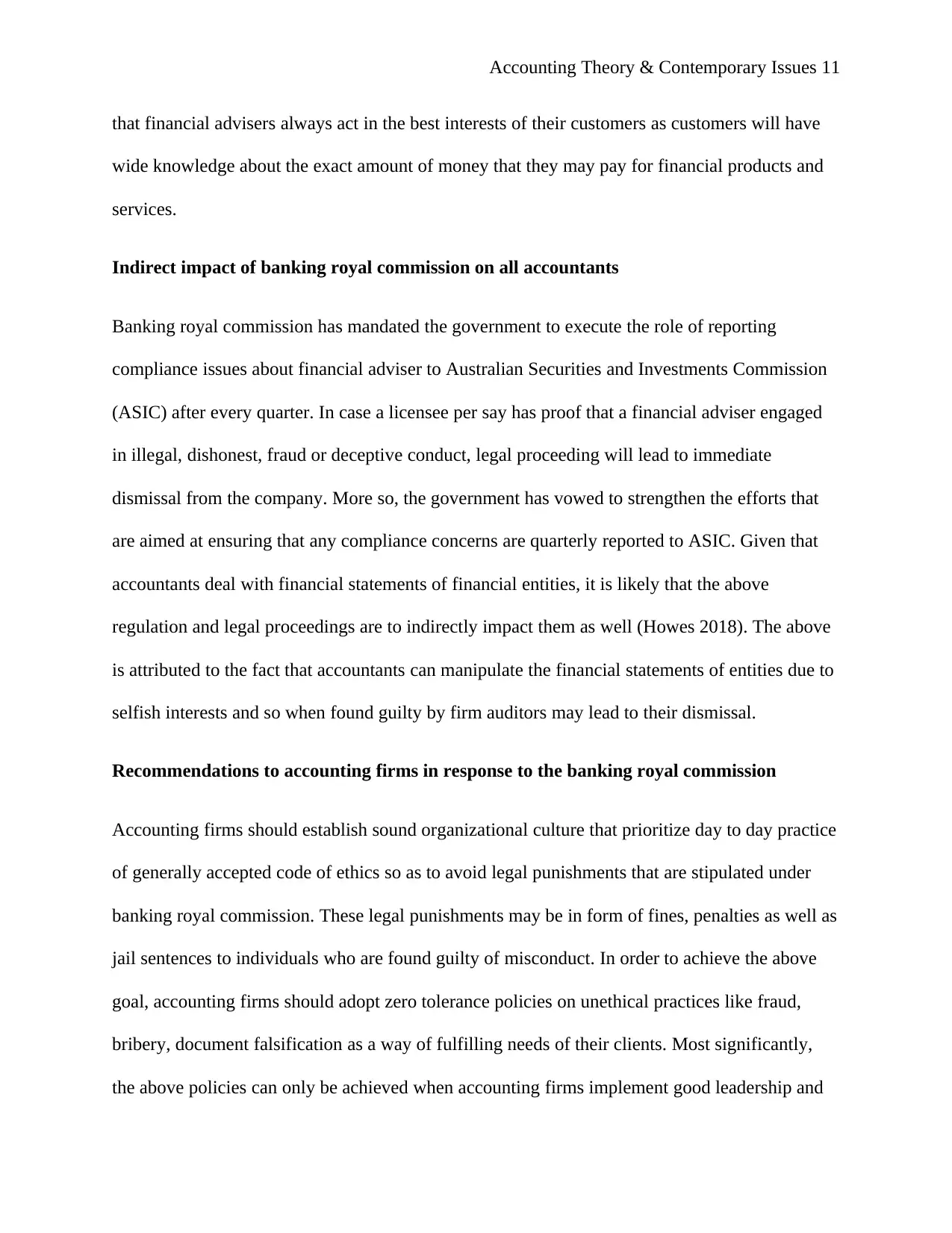
Accounting Theory & Contemporary Issues 11
that financial advisers always act in the best interests of their customers as customers will have
wide knowledge about the exact amount of money that they may pay for financial products and
services.
Indirect impact of banking royal commission on all accountants
Banking royal commission has mandated the government to execute the role of reporting
compliance issues about financial adviser to Australian Securities and Investments Commission
(ASIC) after every quarter. In case a licensee per say has proof that a financial adviser engaged
in illegal, dishonest, fraud or deceptive conduct, legal proceeding will lead to immediate
dismissal from the company. More so, the government has vowed to strengthen the efforts that
are aimed at ensuring that any compliance concerns are quarterly reported to ASIC. Given that
accountants deal with financial statements of financial entities, it is likely that the above
regulation and legal proceedings are to indirectly impact them as well (Howes 2018). The above
is attributed to the fact that accountants can manipulate the financial statements of entities due to
selfish interests and so when found guilty by firm auditors may lead to their dismissal.
Recommendations to accounting firms in response to the banking royal commission
Accounting firms should establish sound organizational culture that prioritize day to day practice
of generally accepted code of ethics so as to avoid legal punishments that are stipulated under
banking royal commission. These legal punishments may be in form of fines, penalties as well as
jail sentences to individuals who are found guilty of misconduct. In order to achieve the above
goal, accounting firms should adopt zero tolerance policies on unethical practices like fraud,
bribery, document falsification as a way of fulfilling needs of their clients. Most significantly,
the above policies can only be achieved when accounting firms implement good leadership and
that financial advisers always act in the best interests of their customers as customers will have
wide knowledge about the exact amount of money that they may pay for financial products and
services.
Indirect impact of banking royal commission on all accountants
Banking royal commission has mandated the government to execute the role of reporting
compliance issues about financial adviser to Australian Securities and Investments Commission
(ASIC) after every quarter. In case a licensee per say has proof that a financial adviser engaged
in illegal, dishonest, fraud or deceptive conduct, legal proceeding will lead to immediate
dismissal from the company. More so, the government has vowed to strengthen the efforts that
are aimed at ensuring that any compliance concerns are quarterly reported to ASIC. Given that
accountants deal with financial statements of financial entities, it is likely that the above
regulation and legal proceedings are to indirectly impact them as well (Howes 2018). The above
is attributed to the fact that accountants can manipulate the financial statements of entities due to
selfish interests and so when found guilty by firm auditors may lead to their dismissal.
Recommendations to accounting firms in response to the banking royal commission
Accounting firms should establish sound organizational culture that prioritize day to day practice
of generally accepted code of ethics so as to avoid legal punishments that are stipulated under
banking royal commission. These legal punishments may be in form of fines, penalties as well as
jail sentences to individuals who are found guilty of misconduct. In order to achieve the above
goal, accounting firms should adopt zero tolerance policies on unethical practices like fraud,
bribery, document falsification as a way of fulfilling needs of their clients. Most significantly,
the above policies can only be achieved when accounting firms implement good leadership and
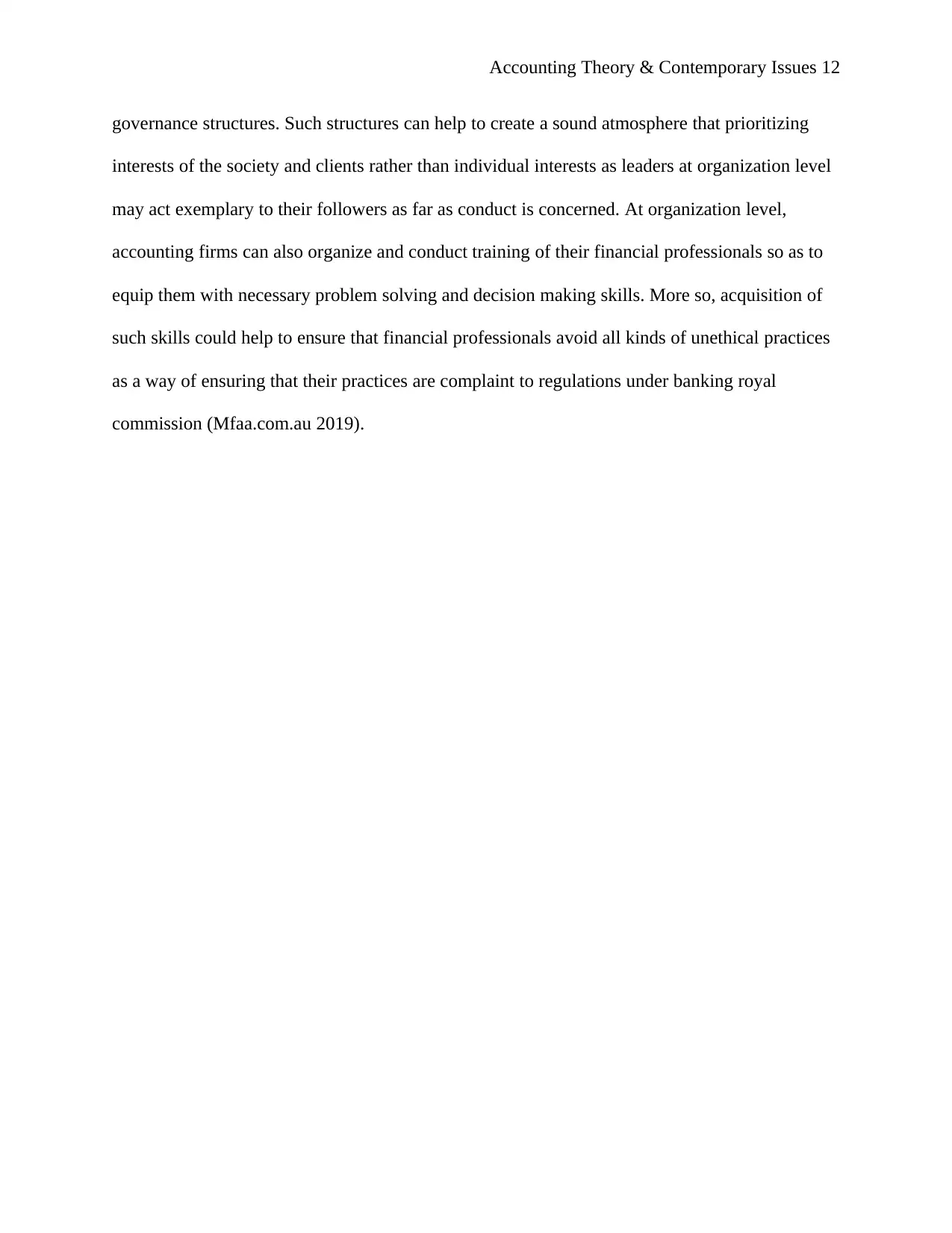
Accounting Theory & Contemporary Issues 12
governance structures. Such structures can help to create a sound atmosphere that prioritizing
interests of the society and clients rather than individual interests as leaders at organization level
may act exemplary to their followers as far as conduct is concerned. At organization level,
accounting firms can also organize and conduct training of their financial professionals so as to
equip them with necessary problem solving and decision making skills. More so, acquisition of
such skills could help to ensure that financial professionals avoid all kinds of unethical practices
as a way of ensuring that their practices are complaint to regulations under banking royal
commission (Mfaa.com.au 2019).
governance structures. Such structures can help to create a sound atmosphere that prioritizing
interests of the society and clients rather than individual interests as leaders at organization level
may act exemplary to their followers as far as conduct is concerned. At organization level,
accounting firms can also organize and conduct training of their financial professionals so as to
equip them with necessary problem solving and decision making skills. More so, acquisition of
such skills could help to ensure that financial professionals avoid all kinds of unethical practices
as a way of ensuring that their practices are complaint to regulations under banking royal
commission (Mfaa.com.au 2019).
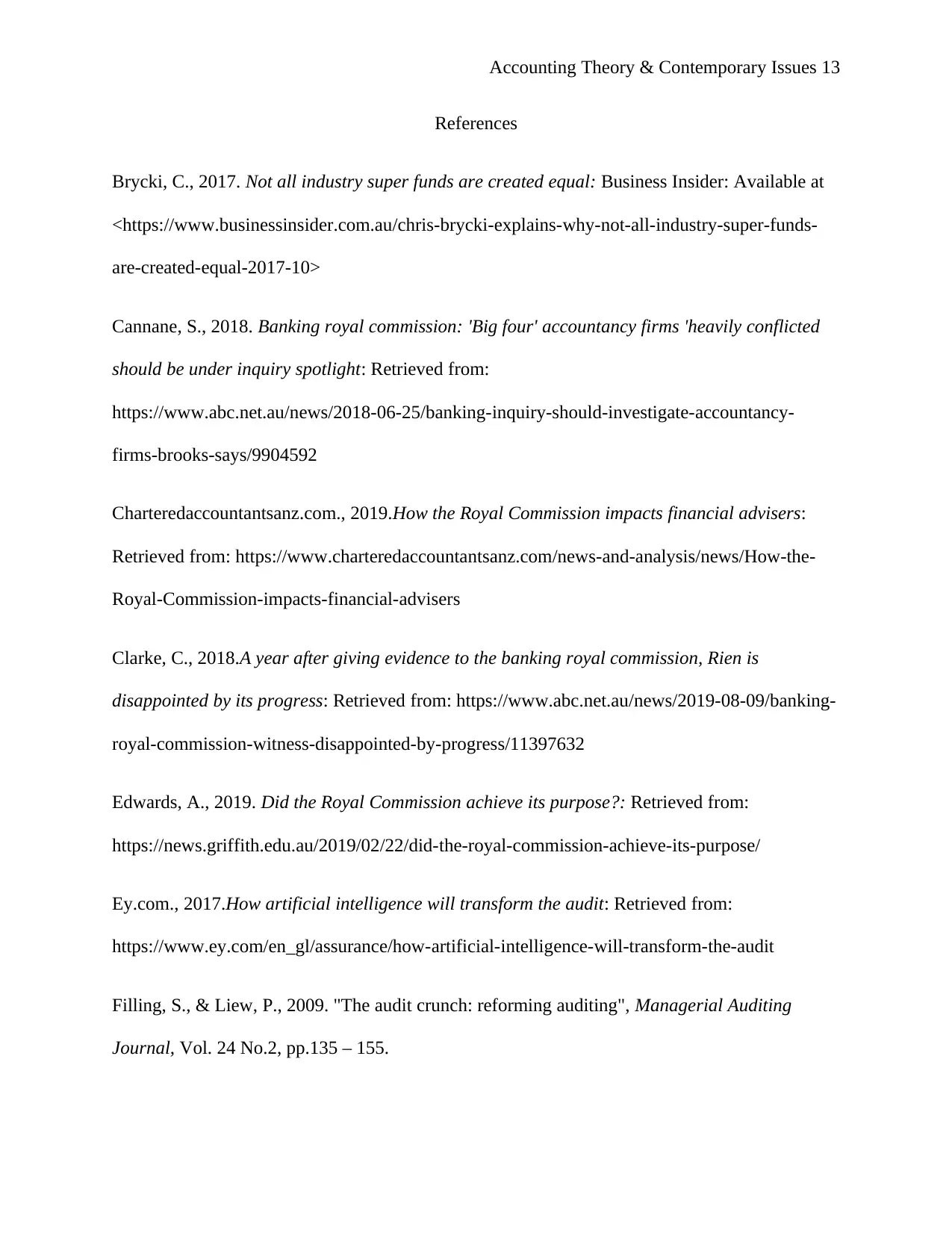
Accounting Theory & Contemporary Issues 13
References
Brycki, C., 2017. Not all industry super funds are created equal: Business Insider: Available at
<https://www.businessinsider.com.au/chris-brycki-explains-why-not-all-industry-super-funds-
are-created-equal-2017-10>
Cannane, S., 2018. Banking royal commission: 'Big four' accountancy firms 'heavily conflicted
should be under inquiry spotlight: Retrieved from:
https://www.abc.net.au/news/2018-06-25/banking-inquiry-should-investigate-accountancy-
firms-brooks-says/9904592
Charteredaccountantsanz.com., 2019.How the Royal Commission impacts financial advisers:
Retrieved from: https://www.charteredaccountantsanz.com/news-and-analysis/news/How-the-
Royal-Commission-impacts-financial-advisers
Clarke, C., 2018.A year after giving evidence to the banking royal commission, Rien is
disappointed by its progress: Retrieved from: https://www.abc.net.au/news/2019-08-09/banking-
royal-commission-witness-disappointed-by-progress/11397632
Edwards, A., 2019. Did the Royal Commission achieve its purpose?: Retrieved from:
https://news.griffith.edu.au/2019/02/22/did-the-royal-commission-achieve-its-purpose/
Ey.com., 2017.How artificial intelligence will transform the audit: Retrieved from:
https://www.ey.com/en_gl/assurance/how-artificial-intelligence-will-transform-the-audit
Filling, S., & Liew, P., 2009. "The audit crunch: reforming auditing", Managerial Auditing
Journal, Vol. 24 No.2, pp.135 – 155.
References
Brycki, C., 2017. Not all industry super funds are created equal: Business Insider: Available at
<https://www.businessinsider.com.au/chris-brycki-explains-why-not-all-industry-super-funds-
are-created-equal-2017-10>
Cannane, S., 2018. Banking royal commission: 'Big four' accountancy firms 'heavily conflicted
should be under inquiry spotlight: Retrieved from:
https://www.abc.net.au/news/2018-06-25/banking-inquiry-should-investigate-accountancy-
firms-brooks-says/9904592
Charteredaccountantsanz.com., 2019.How the Royal Commission impacts financial advisers:
Retrieved from: https://www.charteredaccountantsanz.com/news-and-analysis/news/How-the-
Royal-Commission-impacts-financial-advisers
Clarke, C., 2018.A year after giving evidence to the banking royal commission, Rien is
disappointed by its progress: Retrieved from: https://www.abc.net.au/news/2019-08-09/banking-
royal-commission-witness-disappointed-by-progress/11397632
Edwards, A., 2019. Did the Royal Commission achieve its purpose?: Retrieved from:
https://news.griffith.edu.au/2019/02/22/did-the-royal-commission-achieve-its-purpose/
Ey.com., 2017.How artificial intelligence will transform the audit: Retrieved from:
https://www.ey.com/en_gl/assurance/how-artificial-intelligence-will-transform-the-audit
Filling, S., & Liew, P., 2009. "The audit crunch: reforming auditing", Managerial Auditing
Journal, Vol. 24 No.2, pp.135 – 155.
Paraphrase This Document
Need a fresh take? Get an instant paraphrase of this document with our AI Paraphraser
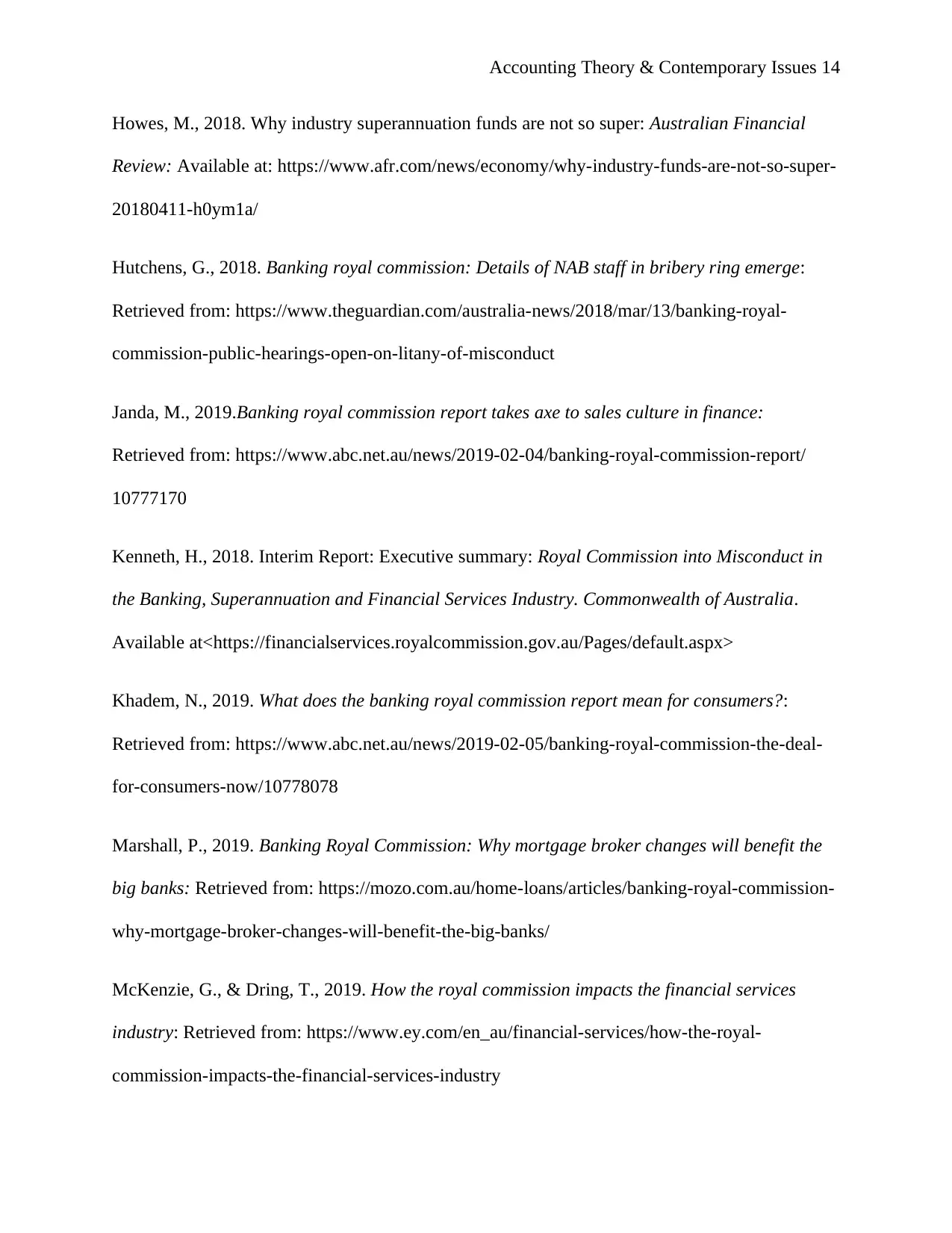
Accounting Theory & Contemporary Issues 14
Howes, M., 2018. Why industry superannuation funds are not so super: Australian Financial
Review: Available at: https://www.afr.com/news/economy/why-industry-funds-are-not-so-super-
20180411-h0ym1a/
Hutchens, G., 2018. Banking royal commission: Details of NAB staff in bribery ring emerge:
Retrieved from: https://www.theguardian.com/australia-news/2018/mar/13/banking-royal-
commission-public-hearings-open-on-litany-of-misconduct
Janda, M., 2019.Banking royal commission report takes axe to sales culture in finance:
Retrieved from: https://www.abc.net.au/news/2019-02-04/banking-royal-commission-report/
10777170
Kenneth, H., 2018. Interim Report: Executive summary: Royal Commission into Misconduct in
the Banking, Superannuation and Financial Services Industry. Commonwealth of Australia.
Available at<https://financialservices.royalcommission.gov.au/Pages/default.aspx>
Khadem, N., 2019. What does the banking royal commission report mean for consumers?:
Retrieved from: https://www.abc.net.au/news/2019-02-05/banking-royal-commission-the-deal-
for-consumers-now/10778078
Marshall, P., 2019. Banking Royal Commission: Why mortgage broker changes will benefit the
big banks: Retrieved from: https://mozo.com.au/home-loans/articles/banking-royal-commission-
why-mortgage-broker-changes-will-benefit-the-big-banks/
McKenzie, G., & Dring, T., 2019. How the royal commission impacts the financial services
industry: Retrieved from: https://www.ey.com/en_au/financial-services/how-the-royal-
commission-impacts-the-financial-services-industry
Howes, M., 2018. Why industry superannuation funds are not so super: Australian Financial
Review: Available at: https://www.afr.com/news/economy/why-industry-funds-are-not-so-super-
20180411-h0ym1a/
Hutchens, G., 2018. Banking royal commission: Details of NAB staff in bribery ring emerge:
Retrieved from: https://www.theguardian.com/australia-news/2018/mar/13/banking-royal-
commission-public-hearings-open-on-litany-of-misconduct
Janda, M., 2019.Banking royal commission report takes axe to sales culture in finance:
Retrieved from: https://www.abc.net.au/news/2019-02-04/banking-royal-commission-report/
10777170
Kenneth, H., 2018. Interim Report: Executive summary: Royal Commission into Misconduct in
the Banking, Superannuation and Financial Services Industry. Commonwealth of Australia.
Available at<https://financialservices.royalcommission.gov.au/Pages/default.aspx>
Khadem, N., 2019. What does the banking royal commission report mean for consumers?:
Retrieved from: https://www.abc.net.au/news/2019-02-05/banking-royal-commission-the-deal-
for-consumers-now/10778078
Marshall, P., 2019. Banking Royal Commission: Why mortgage broker changes will benefit the
big banks: Retrieved from: https://mozo.com.au/home-loans/articles/banking-royal-commission-
why-mortgage-broker-changes-will-benefit-the-big-banks/
McKenzie, G., & Dring, T., 2019. How the royal commission impacts the financial services
industry: Retrieved from: https://www.ey.com/en_au/financial-services/how-the-royal-
commission-impacts-the-financial-services-industry
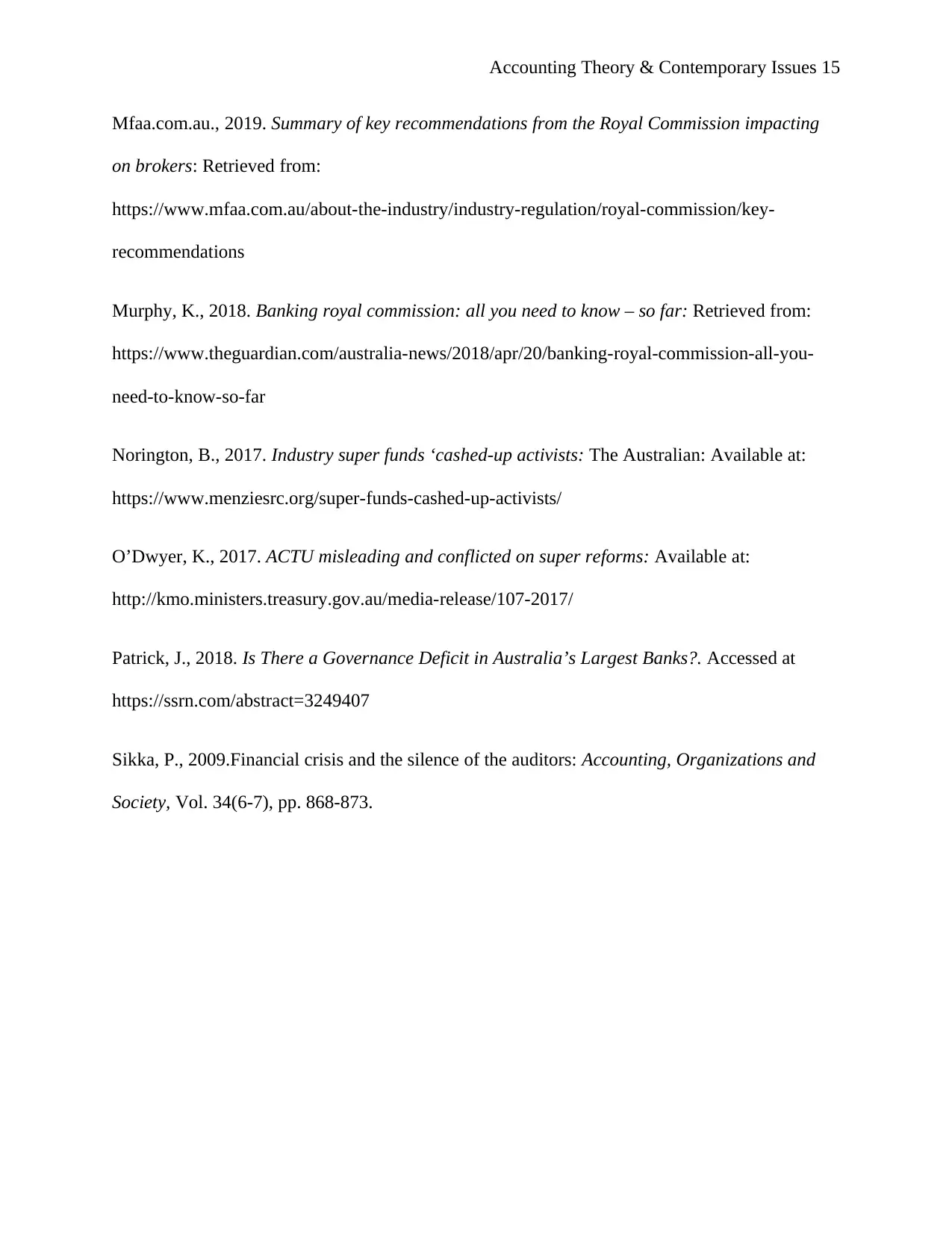
Accounting Theory & Contemporary Issues 15
Mfaa.com.au., 2019. Summary of key recommendations from the Royal Commission impacting
on brokers: Retrieved from:
https://www.mfaa.com.au/about-the-industry/industry-regulation/royal-commission/key-
recommendations
Murphy, K., 2018. Banking royal commission: all you need to know – so far: Retrieved from:
https://www.theguardian.com/australia-news/2018/apr/20/banking-royal-commission-all-you-
need-to-know-so-far
Norington, B., 2017. Industry super funds ‘cashed-up activists: The Australian: Available at:
https://www.menziesrc.org/super-funds-cashed-up-activists/
O’Dwyer, K., 2017. ACTU misleading and conflicted on super reforms: Available at:
http://kmo.ministers.treasury.gov.au/media-release/107-2017/
Patrick, J., 2018. Is There a Governance Deficit in Australia’s Largest Banks?. Accessed at
https://ssrn.com/abstract=3249407
Sikka, P., 2009.Financial crisis and the silence of the auditors: Accounting, Organizations and
Society, Vol. 34(6-7), pp. 868-873.
Mfaa.com.au., 2019. Summary of key recommendations from the Royal Commission impacting
on brokers: Retrieved from:
https://www.mfaa.com.au/about-the-industry/industry-regulation/royal-commission/key-
recommendations
Murphy, K., 2018. Banking royal commission: all you need to know – so far: Retrieved from:
https://www.theguardian.com/australia-news/2018/apr/20/banking-royal-commission-all-you-
need-to-know-so-far
Norington, B., 2017. Industry super funds ‘cashed-up activists: The Australian: Available at:
https://www.menziesrc.org/super-funds-cashed-up-activists/
O’Dwyer, K., 2017. ACTU misleading and conflicted on super reforms: Available at:
http://kmo.ministers.treasury.gov.au/media-release/107-2017/
Patrick, J., 2018. Is There a Governance Deficit in Australia’s Largest Banks?. Accessed at
https://ssrn.com/abstract=3249407
Sikka, P., 2009.Financial crisis and the silence of the auditors: Accounting, Organizations and
Society, Vol. 34(6-7), pp. 868-873.
1 out of 15
Related Documents
Your All-in-One AI-Powered Toolkit for Academic Success.
+13062052269
info@desklib.com
Available 24*7 on WhatsApp / Email
![[object Object]](/_next/static/media/star-bottom.7253800d.svg)
Unlock your academic potential
© 2024 | Zucol Services PVT LTD | All rights reserved.




